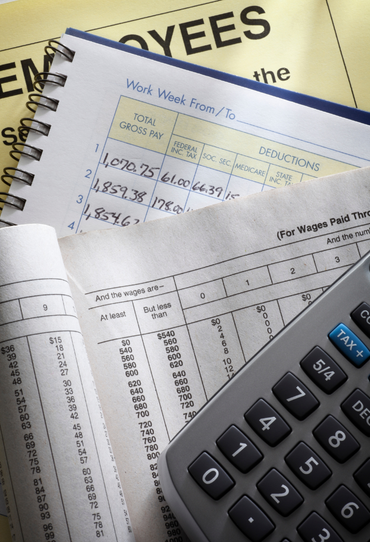Payroll Taxes: A brief overview of what is due and when.
In simple terms, payroll taxes are taxes an employer is subject to simply for having employees. Every employer is responsible for deducting the tax from the employee payroll and paying the tax to the appropriate government agency. There are also payroll taxes that the employer is responsible for, separate from the employee’s tax. Below is a brief overview of the most common types.

Social Security and Medicare Tax
These are also referred to as FICA (Federal Insurance Contributions Act), and might show on a check stub or payroll report as FICA-SS or FICA-Med. They are considered ‘insurance’ taxes and are used to fund the Social Security and Medicare programs.
Both the employer and employee fund this tax. The employer is responsible for withholding the tax from the employees and paying it to the IRS. The social security tax is 6.2% of the employees’ taxable wages and the Medicare tax is 1.45% of the employees’ taxable wages, for a total FICA tax rate of 7.65%. This means that for each $100 you earn, you are paying $7.65 in FICA taxes. The employer must match this amount and pay it to the IRS, making a total tax amount of $15.30 for each $100 earned.
Wage Base Limit
There is a social security ‘wage base limit’. If an employee earns above the wage base limit, then the employee is no longer subject to social security tax for the rest of the year. The employer does not have to pay social security tax on that employee’s wages for the rest of the year either. For 2022, the wage base limit is $147,000. There is an additional Medicare tax of 0.9% for employees that earn more than $200,000 a year. The additional Medicare tax is for employees only, not employers.
Federal Income Tax
This tax is paid only by the employee and may appear on check stubs and payroll reports as FIT. How much tax is withheld is based on how much the employee earns each payroll and how they fill out their federal W4 form. If an employee has too much withheld, they will get a refund when they file their income taxes. Alternatively, if an employee has too little withheld, they will owe when they file their income taxes.
State Income Tax, City, or Local Taxes
These taxes are also paid only by the employee, and may appear on check stubs and payroll reports as SIT, CIT, etc. How much tax is withheld is based on the tax rate and laws in each state, city, or locality. Some states have no state income tax, and the majority of states do not have city or local taxes.
Federal and State Unemployment Tax
Federal unemployment tax (FUTA) is only paid by the employer. The tax rate ranges from .6% to 6% and depends on how much the employer pays in state unemployment tax. State unemployment tax (SUTA) is normally paid only by the employer, but some states require the employees to contribute as well. FUTA will never show on an employee’s check stub but will show on the payroll reports. SUTA will always show on the payroll reports but will only show on an employee’s check stub if their state requires them to contribute.

We hope that this helps to clear up any confusion that you have about payroll taxes. At The Payroll People, we are dedicated to helping our clients understand all aspects of payroll.
We would love the opportunity to provide your business or organization with a complimentary payroll quote.



